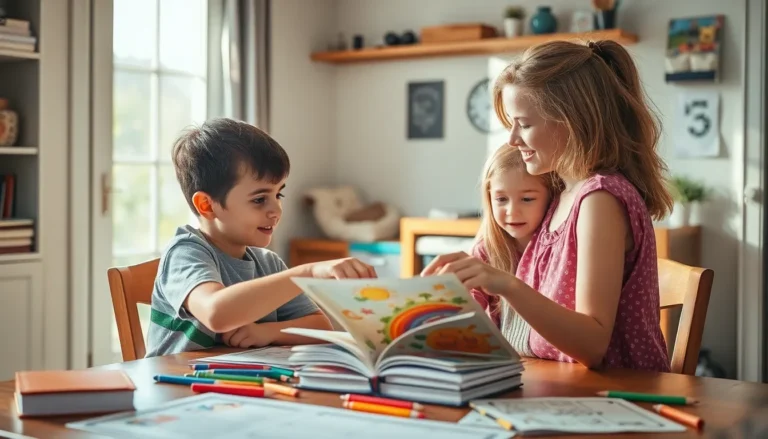Table of Contents
ToggleParenting can feel like a never-ending game show where the stakes are high and the rules keep changing. Enter “The Parent Test,” a fresh take on evaluating parenting styles that’s equal parts insightful and entertaining. Ever wondered if your parenting style is more “tiger mom” or “chill dad”? This show takes a deep dive into the quirks and qualities that define how parents navigate the wild world of child-rearing.
With humor and heart, “The Parent Test” challenges parents to confront their choices and behaviors in a way that’s both eye-opening and relatable. From the strict disciplinarian to the laid-back friend, every style has its ups and downs. So grab some popcorn and get ready to explore the fascinating spectrum of parenting styles that might just inspire a few changes in your own approach. After all, who wouldn’t want to ace the ultimate parent test?
Overview of The Parent Test Parenting Styles
“The Parent Test” showcases various parenting styles that reflect how parents approach raising their children. These styles range from authoritative to permissive, each presenting distinct methods and philosophies. Viewers gain insights into how these styles affect children’s behavior and development.
The authoritative style emphasizes high expectations with support and understanding. Parents using this approach encourage independence while maintaining firm guidance. In contrast, permissive parents foster a warm environment but often lack consistent discipline. Such environments promote closeness but may lead to challenges in setting boundaries for children.
Another style displayed is authoritarian parenting, characterized by strict rules and high demands. These parents typically prioritize obedience and discipline over open communication. The outcomes for children in these households may include compliance, but they often experience limited emotional expression.
Lastly, the uninvolved style features minimal engagement from parents. This approach may stem from various factors including stress or lack of resources. Children raised with this style often struggle with self-esteem and academic performance due to a lack of emotional support.
Understanding these diverse styles helps parents reflect on their practices. The show presents relatable situations that challenge participants to evaluate their strategies. Each episode encourages honest conversations among parents, creating an engaging platform for personal growth and insight.
Different Parenting Styles
Understanding various parenting styles helps parents reflect on their practices and their impact on children’s development. The Parent Test highlights four primary styles: authoritative, authoritarian, permissive, and uninvolved.
Authoritative Parenting
Authoritative parenting combines high expectations with warmth and support. Parents using this style encourage independence while providing guidance. They foster open communication, allowing children to express their thoughts and feelings. This approach promotes a strong sense of self and effective problem-solving skills. Research supports that children raised in authoritative homes often achieve higher academic success and demonstrate better social skills.
Authoritarian Parenting
Authoritarian parenting emphasizes strict rules and high demands without room for flexibility. Parents adopting this style often enforce discipline through control and expect obedience. Communication tends to be one-sided, leading to limited emotional expressions from children. While this approach can result in compliance, it risks fostering fear rather than respect. Studies indicate that children from authoritarian backgrounds might struggle with self-esteem and social interactions.
Permissive Parenting
Permissive parents create a warm and nurturing environment, often avoiding strict rules or discipline. They prioritize their children’s happiness and may indulge their desires. While this style promotes creativity and self-expression, it can lead to challenges in self-regulation and responsibility. Children raised by permissive parents may struggle with authority and face difficulties in structured settings. Research shows that setting some boundaries alongside warmth can enhance children’s emotional wellness.
Uninvolved Parenting
Uninvolved parenting features minimal engagement and emotional connection. Parents adopting this style often prioritize their needs over those of their children. This lack of guidance can significantly affect children’s self-esteem and academic performance. Studies indicate that children from uninvolved households may face higher risks of behavioral issues and emotional struggles. Encouraging involvement and interaction can lead to healthier development and stronger family relationships.
Comparing The Parent Test Parenting Styles
Understanding the strengths and weaknesses of each parenting style allows parents to evaluate their approaches effectively.
Strengths of Each Style
Authoritative parenting encourages independence and open communication, helping children develop strong social skills. Research indicates that children from authoritative homes often excel academically. In contrast, authoritarian parenting enforces structure and discipline, leading to well-behaved children in certain scenarios. Permissive parenting fosters creativity and emotional intelligence, allowing children to express themselves freely. Lastly, uninvolved parenting might lead to self-sufficiency as children navigate their challenges independently.
Weaknesses of Each Style
Authoritative parenting may inadvertently overwhelm children with high expectations, stressing them in their pursuit of excellence. Authoritarian parents sometimes inhibit children’s self-esteem, resulting in compliance-driven behaviors that may lack authenticity. Permissive parents face challenges with discipline, potentially leading to issues with authority and self-regulation. Uninvolved parenting often results in emotional struggles and low academic performance, as children miss critical guidance and support.
Implementing Effective Parenting Techniques
Exploring effective parenting techniques begins with understanding the unique needs of each child. Communication serves as a cornerstone of successful parenting, enabling parents to connect with their children openly. Establishing routines enhances stability, allowing children to thrive in a structured environment.
Modeling behaviors significantly impacts children’s development. When parents demonstrate positive habits like empathy and resilience, children often mirror those traits. Encouragement can foster a sense of achievement, motivating children to engage in new challenges. Praise should be specific, focusing on effort rather than inherent traits.
Setting clear boundaries remains essential in guiding behavior. Allowing children to understand consequences deepens their sense of responsibility. Offering choices empowers children, promoting independence while keeping them aligned with established rules.
Cultivating emotional intelligence involves teaching children to identify and express their feelings. Parents can initiate discussions about emotions, helping children articulate their thoughts. Engaging in shared activities strengthens bonds, reinforcing emotional security and trust.
Adapting techniques to suit each child’s personality provides a tailored approach. For instance, some children may respond better to a gentle nudge, while others might need firm guidance. Regularly reassessing methods allows parents to align parenting techniques with the evolving needs of their children.
Research consistently highlights the benefits of an authoritative style in fostering long-term success. This approach creates balanced environments where high expectations coexist with emotional support. Parenting techniques under this style lead to enhanced social skills and academic achievement, proving effective across diverse family dynamics.
“The Parent Test” serves as a valuable resource for parents seeking to enhance their child-rearing practices. By exploring various parenting styles and their impacts, it encourages self-reflection and growth. The show’s entertaining format makes it easier for parents to engage with important concepts while considering their unique approaches.
Understanding the strengths and weaknesses of each style empowers parents to make informed decisions. As they navigate the complexities of raising children, the insights gained from the show can lead to improved communication and stronger relationships. Ultimately, “The Parent Test” inspires parents to embrace their roles with confidence and adaptability, fostering a nurturing environment for their children’s development.







